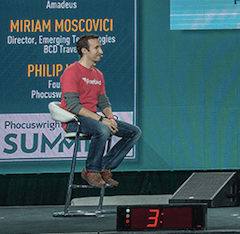The educational workshops at the 2016 Phocuswright Conference didn’t begin until Tuesday, Nov. 15, but by Monday morning, more than 1,000 attendees had already checked in to registration at the JW Marriott Los Angeles L.A. LIVE. The preconference audience, made up of C-level executives and decision-makers from some of the biggest brands in travel and hospitality, showed up early to catch the first phase of the Phocuswright Innovation Platform.
Catherine Plummer, vice president of events at Phocuswright, describes the Innovation Platform as a competition in the spirit of ABC’s entrepreneurial reality contest “Shark Tank.” With three tiers—Battleground, Summit, and Launch—the 2016 program included 67 startups along with more-established companies that are developing technologies to disrupt the travel industry. The companies were all working on projects that affect different elements of hotels, airlines, and online booking, but they came to the Phocuswright Conference with one common goal: to appeal to venture capitalists who can fund their futures.
The competition starts with the Battleground phase. Contestants pay a small application fee, then a $2,500 entrance fee if they’re chosen for the competition. In 2016, 24 companies qualified. “The price to participate in Battleground is less than the cost to attend the Phocuswright Conference,” Plummer said. “We try to keep the barrier to entry as low as possible for these young companies.”
Once at Phocuswright, the action happens right onstage. “We bring in industry leaders (dragons)—some of the most respected names in travel—to offer candid thoughts on each presentation,” Plummer said. “They complete score sheets, critique the ideas, and offer live feedback in front of the audience.”
Three Battleground winners move on to deliver 10-minute presentations in the more mature Summit phase, which in 2016 took place on Tuesday, the first official day of the conference. While Bat-tleground companies are all 24 months old or younger with less than $1 million in VC funding, Summit contestants are 48 months or older and have no funding limit. Their entrance fee is steeper, at $5,000, but the higher price tag comes with more opportunities, such as the chance to take home the Brand USA Marketing Innovation Award, related to tourism marketing, and a prize from General Catalyst that gives a company a $100,000 convertible bridge loan. But even before winning, Summit contestants receive another big benefit: increased brand awareness. They present on the conference main stage during the first official day of programming.

Three Battleground winners move to the Summit level, where they get feedback on their 10-minute pitches about their travel-industry startup from four industry experts. The ‘Shark Tank’–style Innovation Platform has been a popular feature of the Phocuswright Conference since 2008.
“When companies are at the Summit level, we offer them hours of consulting time with our technology analysts, and everyone on our staff works to make sure that they are ready to put their best foot forward,” Plummer said. “A presentation to this type of high-level audience can really make or break their future, so we try to hold their hand throughout the entire process.”
The action isn’t confined to the stage, though. Members of the audience use the conference’s mobile app to vote for first-place and runner-up awards for travel innovation, as well as Brand USA and General Catalyst, and People’s Choice awards. At Launch, the highest level of competition, established companies pay a $20,000 entrance fee to present on the second-to-last day of the conference—in 2016, on Wednesday, Nov. 16. “In the past, we judged all contestants with the same criteria,” Plum-mer said, “but [this year] made some changes because more mature companies aren’t on the same playing field.”
Instead of having a panel of dragons judge Launch competitors, Phocuswright organizes a “phocus” group of judges representing all the segments of the industry; winners are determined by a combination of opinions from judges and the live voting audience. In 2016, Dayuse.com took home the top prize for its platform, which is designed to optimize inventory at hotels while giving guests affordable options for daytime rooms.
But while Dayuse claimed the trophy, every company that participated in the Innovation Platform had reason to celebrate. “Whether a company wins or loses, they are still among an audience of high-level thinkers in the travel industry,” Plummer said. “They all go home with critical exposure and expert feedback, and that can be worth more than money as they work to chart their courses forward.”
That was the case for Zizoo, a Berlin-based boat-rental platform and 2015 Battleground winner. “Winning the Innovation [Platform] award helped us gain tremendous exposure to potential partners and investors of a really high caliber,” said Zizoo CEO Anna Banicevic, “which had an immediate impact on our business.”

